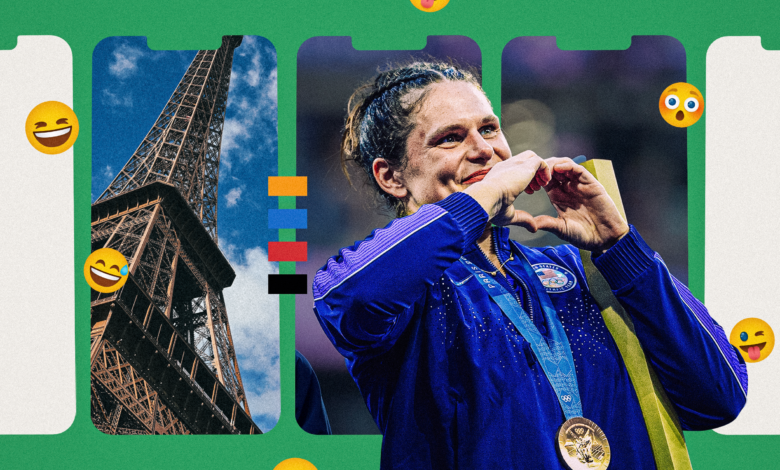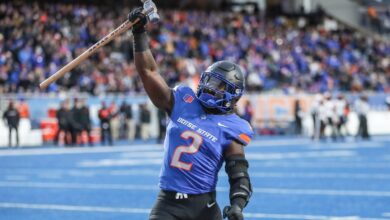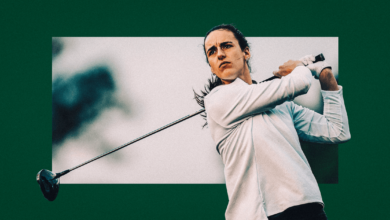How Athletes Won TikTok Gold at the Olympics — While Others Avoid the Distraction

This summer’s Olympic Games are being called the ‘TikTok Olympics’.
Why? Because of the sheer amount of behind-the-scenes content produced by the athletes themselves, which is then shared and viewed by TikTok’s billion monthly users.
Ilona Maher is one of the athletes who has taken TikTok gold. The rugby player is a member of the US sevens team (who won bronze by beating Australia 14-12) and has become a social media sensation in Paris.
The 27-year-old’s funny and authentic videos have seen her overall view count and followers skyrocket in just a few days, with her now amassing 5.1 million followers across TikTok and Instagram combined.
From clips of her trading pins with gymnastics queen Simone Biles, to jokingly mentioning pickleball when posing for a photo with tennis star Coco Gauff, to getting former Philadelphia Eagles player Jason Kelce to call himself a fan of the US women’s rugby team.
Maher, who is now the most followed rugby player on Instagram, has also used her platform to share body-positive messages, reaching a large audience far beyond her sport, or sport in general.
“It’s really important to have a profile and a profile for our sport,” Maher said. “It’s about building the brand. We’re female rugby players — we’re not getting multi-million dollar contracts, we’re not getting the money we should be getting.
“My friends and I want to promote the sport and get noticed. That’s important in the US, where there’s so much attention for other sports. And I think it’s just about showing the personality that the women have. The game is very strong, not just for men, but for women as well.”
In a video she proudly says: “All body types can become Olympians.”
She first gained a following when she did the same at Tokyo 2020. At the time, it was unusual for athletes to post on social media during the two-week multi-sport event.
“There were a few athletes whose posts did really well, but I can’t remember ever seeing as much content as I do now,” says Ella Jerman, a social media consultant at Ten Toes. The Athletics.
Jerman says that’s because the International Olympic Committee (IOC) has relaxed its social media policies. In Rio de Janeiro in 2016, athletes were only allowed to post photos — before they could share audio or video, they needed IOC approval.
At the Tokyo Games, athletes were allowed to post videos, but not of the opening or closing ceremonies or in competition areas. “In Tokyo, they could film in the Olympic Village, but now they can do opening and closing ceremonies, training areas and competition areas up to an hour before the competition,” Jerman says.
“I think (the popularity of social media use in Paris) is because athletes have been given this freedom. Secondly, it’s maybe just a bit of a copycat culture. The more athletes I’ve seen making these videos, the more they seem to get involved.”
Maher explained what causes this phenomenon: “People seem to love anything to do with the Olympics.”
@ilonamaher Do you recognize yourself in these athletes @paris2024 @Team USA @Olympics #Olympics ♬ original sound – Ilona Maher
Australian women’s soccer goalkeeper Mackenzie Arnold found that a video she shared on TikTok had been viewed more than 42 million times. In a seven-second clip, Arnold and teammate Alanna Kennedy look unfazed by their Olympic uniforms. It’s proven to be a huge hit on the platform.
“For female athletes, it feels like they’re competing in an event where the audience, I think, isn’t as limited as it would be if it was a women’s sporting event,” Jerman says. “That, in turn, can expand the reach of what they’re doing because it’s under the hashtags and the umbrella of Olympic content.
“Mackenzie Arnold, a huge name in women’s football, with 42 million views while people around the world who aren’t fans of women’s football may not know her, is a great example of Olympic reach.”
To give you an idea of the numbers: as of August 1, the hashtag “Olympics” was used in 1.2 million posts on TikTok.
“In the first five days of Paris 2024, we had 233,440 creators create content with that hashtag. That’s an 822 percent increase compared to Tokyo,” said Rollo Goldstaub, the app’s head of global sports partnerships.
“When we started this, we knew it had all the right ingredients to be the biggest content moment in TikTok history. We knew the Olympics were so important.
“We’ve been working with the entire Olympic family on how they use TikTok, with every National Olympic Committee in every market, and with athletes and broadcasters.”
Goldstaub added: “It’s like a window opens into their lives and their experience as Olympians. One comment that really made me laugh was, ‘I’m going to start training now so I can be in the athlete village in four years.’ Before, it might have just been about the chance to win gold. Now, it’s also the chance to be a part of what they’re discovering on TikTok.”
These discoveries include the now legendary chocolate muffins. Norwegian swimmer Henrik Christiansen shared his love for the sticky muffins that athletes could get in the village and it quickly became a trending topic. Now, a host of Olympians, including British sprinter Lina Nielsen and Swedish swimmer Sarah Sjostrom, have gone viral after describing their own quests for the elusive muffins.
Michaela Blyde’s New Zealand rugby sevens teammates filmed her journey from being starstruck by Jamaican sprinter Shelly-Ann Fraser-Pryce to running barefoot down a Parisian road to meet her. Blyde’s chaotically brilliant fangirling was reciprocated when Fraser-Pryce turned up at the Stade de France to support New Zealand on their way to becoming Olympic champions.
@michaelablyde After stop. I just met my idol. The QUEEN of sprinting 👑 barefoot, stained shirt and oversized pants. My family would be so proud. #olympicgames2024 #paris2024 #Jamaica #athletics #shellyannfraserpryce ♬ original sound – Michaela Blyde
What is it that makes TikTok so appealing to this generation of athletes?
“For many of them, they grew up on TikTok as viewers and fans of content,” Goldstaub said of the app, which launched in 2016. “And then also the potential and opportunity that they can find by uploading on TikTok. The discoverability and the ability to reach a large audience early on, which people can find as a brand new uploader. People have the ability to grow channels very quickly, which isn’t always the case elsewhere.”
Maher has experienced tremendous growth across multiple platforms.
“She doubled her Instagram following in a week, which is really crazy,” says Jerman. “Without the Olympics, that wouldn’t normally be possible for a rugby sevens player. The Olympics are an inspiring place for female athletes and those who compete in lesser-known sports.
“It opens up female athletes in particular to a broader and largely accepting audience. There are those dinosaurs who will attack something if it’s presented under the banner of women’s sport. But under the Olympics, that feels like it’s happening less.
“It feels like a space where women can unapologetically speak up, be authentic, and put out content without people tearing it down. I can’t say for sure, but it does seem like women are less likely to get torn down when they’re shown on the same level as men’s events, like tennis.”

GO DEEPER
For Suni Lee, a triumphant Olympic medal is the crowning achievement of an unlikely comeback
Not everyone will be scrolling through social media during the Olympics, and not every athlete will be posting content. British hockey star Tess Howard confirmed that the team has taken a collective break from social media during the tournament.
“It’s all about creating that bubble and making sure we focus on this two-week period that happens once every four years. It’s a very special time,” Howard said after her team defeated the US 5-2 in their Pool B encounter.
“We’re in it together — we don’t have any distractions. We don’t see any comments that maybe… you know, if we hadn’t won our first two games, things might have thrown us off, but we stayed very close together.”
Abigail Tamer, who played for the US team in the lost match, also discussed her team’s self-imposed social media ban.
“It just helps us stay in the moment,” Tamer said. “We talked about that a lot, especially after we got to the Olympics, where it’s so big and on a global scale. It helped us tune out some of the outside distractions and focus on what’s in front of us.”
While many athletes have chosen to avoid the attention of social media, there are many others who have taken the public along in their quest for medals (and muffins) and achieved worldwide fame along the way.
The result is access like never before, with TikTok providing a platform for athletes who might not normally be in the spotlight. For women in particular, it felt like a win.

GO DEEPER
How Noah Lyles Became an Olympic 100-Meter Champion: A 300-Page Textbook, Biomechanics, and a Stick Figure
(Header design: Dan Goldfarb, photos: Getty Images)




